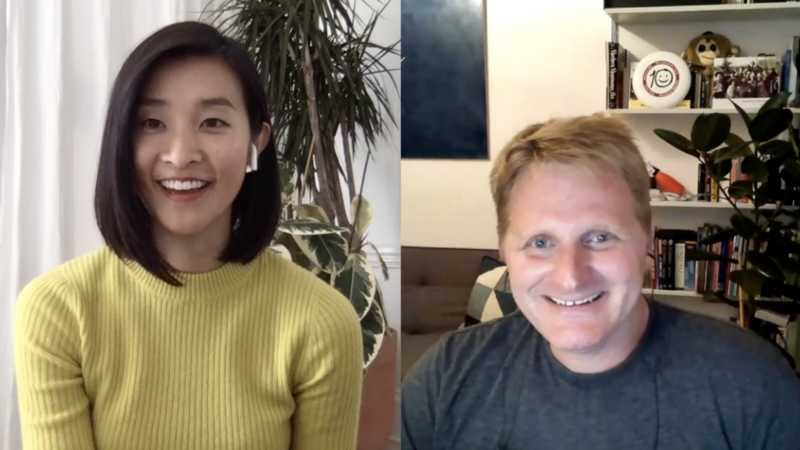As the founder of a 10-year old $6.3+MM bootstrapped company, Peldi talk about how your greatest strength can be your greatest weakness.
Every two weeks as part of The Heartbeat, I
Peldi Guilizzoni is the Founder and CEO of Balsamiq, a 10-year-old, bootstrapped, $6.3+MM annual revenue company with tens of thousands of customers in 193 countries. In our conversation, Peldi reveals a very counterintuitive lesson he’s learned: Our greatest strengths as leaders often hurt us the most.
Claire: Hi, everyone. I’m Claire Lew and I’m the CEO of Know Your Company. I am just thrilled today to have with me the one and only Peldi who is the CEO of Balsamiq, everyone’s favorite prototyping tool. Peldi’s built this amazing company over the past — I don’t know, how many years has it been? We’ve been … Ten, right?
Peldi: Ten.
Claire: I was about to say, I wanted to say 10. It’s been 10 years and I’ve been such a big fan of your work, big admirer of your whole ethos in thinking about building a company. I remember watching your talk a few years ago at Business of Software in Boston. I think that’s where we first originally met. It’s been fun to get to know you, to hang out, to learn from you. Thank you so much for being here today.
Peldi: Thank you. Excuse me. Thank you, Claire. I’m all nervous because you are one of the entrepreneurs that I admire and I follow. I think you are the entrepreneur that has had the most impact on my life for the last year.
Claire: Wow.
Peldi: I’ve basically been reading everything that you ever wrote.
Claire: That just makes my day. I will take that. All is good in life if I can get that from you, Peldi. Thank you so much. One other thing, too, I want to mention to everyone who’s watching The Heartbeat, you’d mentioned to me that you actually also, aside from reaching the 10-year anniversary of Balsamiq, you guys recently launched a web app as well, which is really exciting. Those watching should definitely check that out. Peldi, here’s the thing, I’m here to extract wisdom from you today. I want to ask you this one question that I’ve been asking leaders I really respect and admire, and that question is:
What’s something you wish you would’ve learned earlier as a leader?
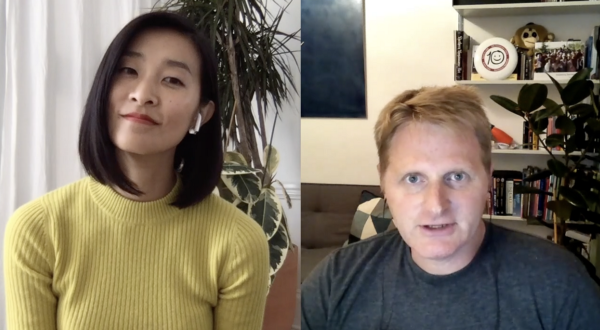
Peldi: Lots of stuff for sure, but there’s one thing that I came across that sort of was a light bulb moment. A few months ago, I was reading some of your guides on how to give feedback, and give and receive and all that. I came across this little video by Leo Widrich who was one of the co-founders of Buffer, and he was talking about some feedback that he had received from Joel of Buffer, which really opened my eyes.
The idea is that sometimes doing what you’re really, really good at actually hurts the company, which is very counterintuitive. Let me explain.
Claire: Yes, please do.
Peldi: In my case, I see it all the time. I’m really good at getting stuff done. I start projects, work on them, communicate with the right people, I make it happen. I do project after project after project after project, and I’m thinking I’m killing it. Then you realize that as a CEO, 10 years into it, I shouldn’t be doing any projects. I should have delegated everything by now. Now the team continues to rely on me to get stuff done instead of learning how to do it themselves. If I ever decide to go on vacation or burn out, then I leave them hanging.
Another example is my whole goal with Balsamiq is to learn as much as I can forever, be challenged and learn. I’m really good at that. If there’s a challenge, I dive in, I do the research, I know how to do research quickly with enough information to solve the problem. I’m learning, I’m learning, I’m learning, I’m learning, and I’m applying, but I’m never teaching what I learn.
Claire: Fascinating, yeah.
Peldi: I become good at all these thousands of different things including GDPR for instance.
Claire: Yeah, you and me both.
Peldi: Yeah, I mean in the last few months, I’ve done a lot of research on GDPR, another research on how to create a culture of feedback, completely unrelated, but things that our company needed. But instead, I should be teaching others how to do research.
Basically, you think you’re doing great, but you should take a step back and think okay, strategically, am I helping the company? Imagine the company without you in 50 years. Are they going to be ready to go?
Claire: Totally.
Peldi:
What I realized is that I should stop myself from doing things I’m good at — which is so counterintuitive — and instead, focus on delegating training and making sure that everybody gets good at doing those things.
Claire: Absolutely. It’s this idea that … I mean there’s so many layers here, Peldi, that I want to sort of peel away at because you talk about essentially saying that you being good at something isn’t enough in a company. It’s not that you just can’t be good at it. It’s other people have to be good at it or else the organization doesn’t become self-sustaining. I think that’s a like you said, it’s a very counterintuitive nuance as a leader to understand that it’s not about me being good at these things. It’s about other people. I think that’s one fascinating takeaway-
Peldi: Yeah, and it’s tricky ’cause no one’s going to stop you because you are doing a bunch of stuff. In Leo’s case, he was lucky he had a co-founder in Joel and Joel realized that this was happening and he told him. I am a solo founder. The employees, no one-
Claire: No one tells you, yeah.
Peldi: It’s not their job. They’re like all right, you’re doing great.
Claire: Yeah. I was going to ask you, that was my next question, what caused you to recognize this realization? Did you have like a wake-up moment? Did someone say something? Was it something you read ?
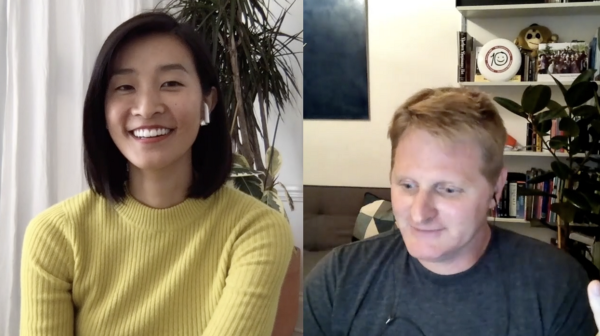
Peldi: It was this little video that I came across while I was doing research on feedback and it was just timely. If I saw that video five years ago, I would’ve said it doesn’t apply to me, whatever. Now 10 years into it, I’m maturing more, I’m finally maturing as a CEO and so, I’m more receptive to that kind of a feedback-
Claire: Absolutely. Question for you then, why do you think, and for folks who are watching I will be sure to share that, that video that Peldi’s alluding to, why would the five years ago version of Peldi have disregarded that video? What is it that’s been different? What are you more open to or more sensitive or self-aware about? What’s changed?
Peldi: What’s changed is that we’re 10 years old now. That was sort of my big old goal from the beginning. I wanted to build a long lasting company and 10 years is pretty impressive for a software company. Now, I’m thinking about the next decade. In the next decade, my new goal is to make sure that I help Balsamiq become stronger than me and able to not only outlast me, but also outgrow me.
Claire: Absolutely. It sounds then like being able to resist seeing your strengths as sort of the only way you can make an impact on the business, it’s the only way actually for the company to grow and to outlast you as the founder, then the organization isn’t just you as the CEO. It’s not just about Peldi. It’s now Balsamiq. It’s something bigger.
The other thing I was curious to get your take on, Peldi, is I was thinking about why it’s actually so difficult for founders to not play into their strengths? For you, you’re good at getting stuff done. You’re good at picking up and learning new things. I was thinking for myself like, “Oh, what are the things that I’m good at?” I think someone might say that, “Claire, you’re good at communicating things, you’re good at writing,” and yet I would argue just like to your point that sometimes, I probably over-communicate things. Even within our tiny, tiny company, I probably over communicate stuff. I’m pretty sure if I were to look back, I’d go I didn’t … It’s good to communicate, but maybe ’cause we’re so small, maybe it’s too much.
Peldi: Yeah, too much, yeah.
Claire: I was thinking about it and I’m curious to get your take on it. I wonder if it’s because we like doing things that we’re good at.
Peldi: Yeah, I think there’s two things, maybe three.
One is definitely there’s a lot of ego that goes into being a founder.
You’re proving to yourself that you can do this over and over. You like the challenge and you like to overcome the challenges. Diving into tough projects is fantastic. It’s another chance to prove to yourself, yes, I’ve overcome this obstacle as well.
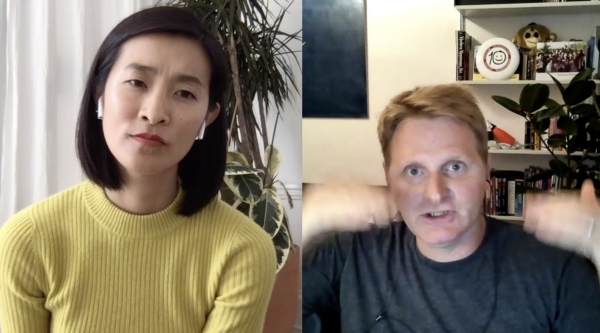
The second thing is after a while — and it’s related — it’s doing things you’re good at becomes something that makes you feel good. ’Cause if you were to focus on the things you need to work on all day, you feel completely inadequate. You don’t know what you’re doing. Sneaking in a project here and there or doing an extra piece of communicating, something that you know is going to work helps you feel better I think. There’s a little bit of a laziness, but also sort of mental health, you need a little bit of a pick-me-up once in a while. Doing what you’re good at is good. Yeah, which is why I guess what you said we like doing that stuff.
The third is that it could be completely a blind spot. You don’t even realize you’re doing it. It’s just a habit. It’s just how you operate, and no one’s stopping you, and you never notice unless you watch this video.
Claire: I was just about to ask you. I mean that was literally my next thing. I was like it almost sounds like if it’s sometimes the things that we’re good at that we like and that makes us feel good that are actually hurting our company, how do we ever find out what these things are, Peldi, other than like you said, stumbling on this video on YouTube?
Peldi: The way Leo did it was having a co-founder or I guess you could have advisers, but they don’t work with you day after day all day so they might never notice as well. I think over time, if you have an executive team, you have to teach them to do this as well. You have to create a culture of feedback so strong that they will even give you feedback about stuff that you’re good at, not just what you need to work on. But I bet that’s really tough to create and I haven’t been able to do it so far, but I’m working on it.
Claire: It’s an imperfect process and more art than science I think. I am curious, too, I can only imagine, there are some folks who are watching this, Peldi, who are thinking maybe, maybe some strengths are getting in the way, but there are certain things in my company, Peldi, that I only can do. There are certain things that only I am good at.
Peldi: Absolutely.
Claire: How do we as leaders, how do we make that distinction between these are the things I actually cannot give up and compromise on because Balsamiq would completely just go off the deep end and then, these are things where no, I need to get this off my plate, I need to teach other people how to do this stuff? How do you make that distinction?
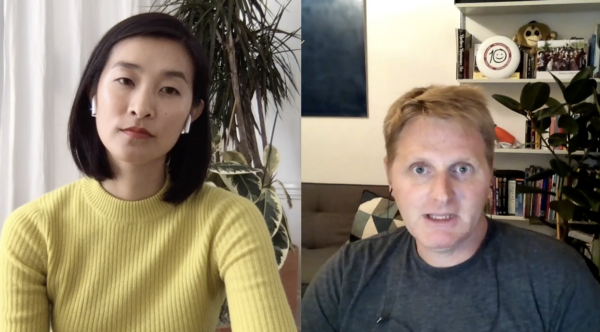
Peldi: I think the answer changes depending on where your company is in its lifetime. I think I can only start thinking about these things now because we are stable. We are very profitable from the beginning. We have 30 people now and so, there is a chance that we’re going to stay in business for another few years. It’s pretty likely. So my horizon expands because I have these certainties. Five years ago, if somebody said, “You need to think two years in advance,” I would say, “You’re crazy. I’m drowning. I’m just trying to tread water here.” To people who say that, I say, “Fair enough.” If it’s very likely not applicable to you, but you should keep this in the back of your mind for the future because I feel … I don’t know. Not everybody’s goal in life is to build a long lasting company.
Claire: Sure.
Peldi: But if that’s your goal, then you have to keep this in mind because you’re not going to be around forever. After a while, you get too old. You want to retire or something happens, you want to-
Claire: Yeah, do something else, yeah.
Peldi:
What I wish I would’ve done is ratcheted down my doing and my learning, and increased the teaching to do it gradually ’cause now I’m 10 years in and I’m realizing that the company revolves around me too much still.
And I burned out and I’m like, “You guys, I’m out. See you in a couple of months,” and that’s a disaster ’cause they’re not ready. I haven’t prepared them. But actually, what’s happening is that my team kicks ass and they all stepped up, and they’re teaching me how to do it so it’s awesome.
Claire: Yeah, they saved you. I feel you. I feel you. I think I mean for me personally, Peldi, as a leader, one thing that I’m taking away is to not assume always that our strengths are good for the company, just not to make that correlation so automatic. I love that. That’s something I’m going to be taking away. Two, I think this idea of reflecting on how focusing too much on our strengths can actually strangle the company I think is also a really interesting takeaway. I think regardless of business life span, I’m thinking even that small reflection process whether you take 10 minutes once a year or you survey your employees and you would just ask a couple people like, “Hey, would you like to know how to do this stuff? Would you like to be doing more of this stuff?” Then I love lastly, one thing I really hope people take away is this idea that teach more, do less and maybe the longer your company is in business for, maybe you ramp up the teaching and you lower the doing.
Peldi: Exactly, exactly.
Claire: I think that’s how you scale. I think that’s incredible wisdom.
Peldi: I wish.
Claire: Hey, I’m learning from you. We’re all learning from you, Peldi. Thank you so much for being a part of this. We all appreciate it.
Peldi: Thank you very much, Claire.
